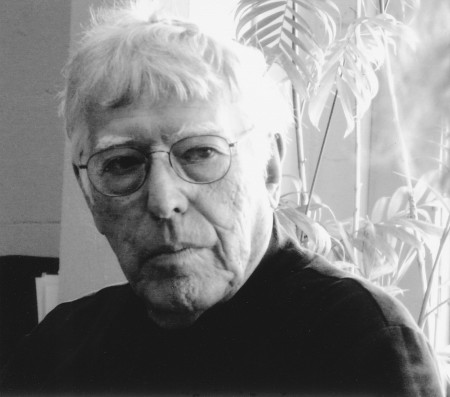Stephen Kessler on Richard O. Moore
PoetryFlash has just published an excellent, in-depth article on Richard Moore by Stephen Kessler. Below, the opening paragraphs; you can read the whole article here.
Golden Codger: The Odd Career of Richard O. Moore
by Stephen Kessler
There all the golden codgers lay,
There the silver dew… (W. B. Yeats)The trouble with everything
is that it’s true. (Richard O. Moore)RICHARD O. MOORE, who died March 25, 2015, at ninety-five, had one of the strangest career arcs of any poet I’ve known. Born in Ohio in 1920, raised in insecure and itinerant circumstances during the Great Depression and orphaned in his teens, he came to the Bay Area in the late 1930s to attend UC Berkeley, gravitated in the 1940s to the circle of young poets and anarcho-pacifist intellectuals around the charismatic Kenneth Rexroth, and became a key figure in the San Francisco Renaissance, the watershed West Coast cultural awakening that preceded the more sensational Beat era and whose echoes resonate to this day. Like many of his peers at the time, Moore published his early poems in little magazines, but by the late 1940s he was fatefully involved—along with his wife Eleanor McKinney, media visionary Lewis Hill and others—in launching the first listener-sponsored public radio station in the United States, Berkeley’s KPFA. Moore’s deep, deliberately modulated voice introduced the first program (Anglo-American Folk Ballads) when the station went on the air in 1949, and he was instrumental in shaping its initial identity as a forum for free speech and culturally sophisticated programming (including Rexroth’s legendary extemporaneous monologues on books).
[…]
It was in 1992, when I moved to Gualala Ridge just a few miles from the home he had constructed with his builder sons (from his third marriage, to his wife Ruth, with whom he had four children), that I first made Richard’s acquaintance. We must have met at a poetry reading—there was a series in a local coffeehouse—and gradually got to know each other, and over the next couple of decades became good friends, frequent dinner companions (especially after Ruth’s death in 1997) and constant interlocutors on the subject of poets and poetry. Despite our generational differences (he was twenty-seven years my senior) and our different kinds of poetics (he was the more cerebral modernist and I the lyrical romantic), our personalities somehow clicked; we knew, or had known at different times, a lot of the same people; and we shared an irrational and irrepressible yet sober devotion to poetry.
[ctd.here]


 “Todesguge/Deathfugue”
“Todesguge/Deathfugue” “Interglacial Narrows (Poems 1915-2021)”
“Interglacial Narrows (Poems 1915-2021)” “Always the Many, Never the One: Conversations In-between, with Florent Toniello”
“Always the Many, Never the One: Conversations In-between, with Florent Toniello” “Conversations in the Pyrenees”
“Conversations in the Pyrenees” “A Voice Full of Cities: The Collected Essays of Robert Kelly.” Edited by Pierre Joris & Peter Cockelbergh
“A Voice Full of Cities: The Collected Essays of Robert Kelly.” Edited by Pierre Joris & Peter Cockelbergh “An American Suite” (Poems) —Inpatient Press
“An American Suite” (Poems) —Inpatient Press “Arabia (not so) Deserta” : Essays on Maghrebi & Mashreqi Writing & Culture
“Arabia (not so) Deserta” : Essays on Maghrebi & Mashreqi Writing & Culture “Barzakh” (Poems 2000-2012)
“Barzakh” (Poems 2000-2012) “Fox-trails, -tales & -trots”
“Fox-trails, -tales & -trots” “The Agony of I.B.” — A play. Editions PHI & TNL 2016
“The Agony of I.B.” — A play. Editions PHI & TNL 2016 “The Book of U / Le livre des cormorans”
“The Book of U / Le livre des cormorans” “Memory Rose Into Threshold Speech: The Collected Earlier Poetry of Paul Celan”
“Memory Rose Into Threshold Speech: The Collected Earlier Poetry of Paul Celan” “Paul Celan, Microliths They Are, Little Stones”
“Paul Celan, Microliths They Are, Little Stones” “Paul Celan: Breathturn into Timestead-The Collected Later Poetry.” Translated & with commentary by Pierre Joris. Farrar, Straus & Giroux
“Paul Celan: Breathturn into Timestead-The Collected Later Poetry.” Translated & with commentary by Pierre Joris. Farrar, Straus & Giroux